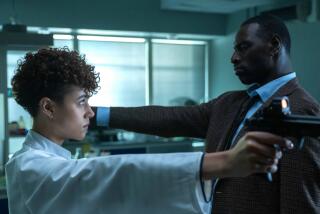MOVIE REVIEW : Woo’s ‘Tomorrow’ Balances Emotion and Violence
- Share via
“A Better Tomorrow” (at the Monica 4-Plex) is high-style vintage John Woo in which the celebrated writer-director has struck a perfect balance between emotion and violence. Its premise could well have been lifted from early Warner Bros.--one brother becomes a gangster, the other, a cop--and it also extols the virtue of loyalty between friends in the tradition of Howard Hawks.
The success of this prize-winning 1986 release, however, rests on a well-developed plot and the three-dimensional characterizations--the second the very quality that was lacking in Woo’s American debut film, the recent “Hard Target.” In its expressive, reflective mix of explosive action and people viewers can care about, “A Better Tomorrow” represents the Hong Kong popular cinema at its very best. (The film is so vital and energetic that Joseph Koo’s score, heavy on heart-tugging strings and sentimental harmonica refrains, seems exactly right, whereas it would sound merely florid in a less sturdy film.)
Ti Lung stars as Sung Tse Ho, the elder of two brothers, a gangster who wants to pull off the familiar one last job before calling it quits. However, when he delivers a cache of counterfeit American currency in Taiwan, he is betrayed by Shing (Waise Lee), a ruthless young cohort determined to take over their gang from its elderly leader. Back in Hong Kong, Shing has Ho’s ailing father rubbed out; Ho winds up doing three years for the counterfeit job, while his younger brother Kit (Leslie Cheung, who has the title role in the current “Farewell, My Concubine”) begins his rise through the ranks of Hong Kong’s police department.
Once out of prison, Ho finds himself plunged into conflict. He’s determined to go straight, accepting a job as a taxi driver for a company staffed by ex-cons, but he’s hotly rejected by the embittered Kit, who understandably holds him responsible for their father’s death and has also made nailing Shing and his gang a top career priority. Meanwhile, Ho encounters his gang partner Mark Lee (Chow Yun-Fat), now a crippled, destitute outcast. On the one hand, Ho wants to redeem himself with Kit, and on the other, to do the right thing by Mark; how is he to achieve all this and stick to the straight and narrow? For that matter, how is Ho to steer clear of escalating warfare between Kit and Shing?
That the answers to these questions are forthcoming swiftly takes on an aura of inevitability as “A Better Tomorrow” proceeds imaginatively with a hard-driving relentlessness, one tense, action-filled incident tightly triggering the next. Even so, Woo has time for Mark, looking out over the city from a mountaintop, to observe forlornly, “Hong King is beautiful at night, but it doesn’t mean anything,” and for Ho’s new boss, an ex-con himself, to wonder aloud, “If a guy has been bad one day of his life, will he ever be a good guy again?”
Despite moving at as fast a clip as he does, Woo has been able to get absolutely winning performances all around, especially from Ti Lung as a classic good-bad guy, from the handsome, charismatic Chow Yun-Fat as the most nobly loyal of friends, and from Leslie Cheung a portrayal of a fiery youth who matures painfully from smug avenger to a wise and comprehending adult. It’s well worth forgiving “A Better Tomorrow” (Times-rated Mature for gangster violence) its pidgin English subtitles, pretty much a norm for Hong Kong films until recently.
‘A Better Tomorrow’
Ti Lung: Sung Tse Ho Chow Yun-Fat: Mark Lee Leslie Cheung: Kit Sung Waise Lee: Shing
A Rim Film release of a Cinema City Co. Ltd. presentation of a Film Workshop production. Writer-director John Woo. Co-producer Tsui Hark. Action choreographers Blackie Ko, Tung Wei. Cinematographer Wong Wing-Heng. Editor Kam Ma. Production & costume designer Bennie Lui. Music Joseph Koo. Sound Benny Lee. In Cantonese, with English and Chinese subtitles. Running time: 1 hour, 35 minutes.
Times-rated Mature (for gangster violence).
More to Read
Only good movies
Get the Indie Focus newsletter, Mark Olsen's weekly guide to the world of cinema.
You may occasionally receive promotional content from the Los Angeles Times.










